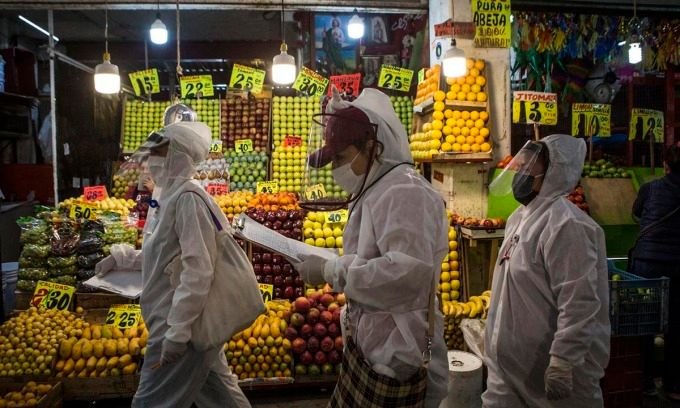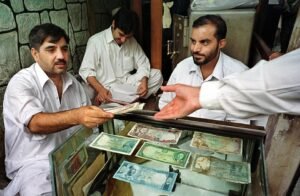
Covid-19 crept throughout Latin America's largest market 3
From mid-April to mid-May, at least 10 tomato sellers at Central de Abasto, the largest food market in Latin America located in the capital of Mexico, died from nCoV.
`Here we don’t believe Covid-19 is a threat. But when we see people passing away one by one, we no longer have any doubts,` said Anastasio Ramon Alonso, another longtime tomato seller in the market.
On April 26, Hector Garcia, manager of Central de Abasto market, announced that nCoV was discovered in the 3.3 square kilometer wholesale market.
Health workers walk around the Central de Abasto market in Mexico City, Mexico, taking people’s temperatures.
Mateo has been selling at Central de Abasto for more than three decades.
Many of Mateo’s colleagues also have chronic diseases, such as David Hernandez, a diabetic who died of nCoV in mid-April. On the other side of Mateo’s booth, Isaac Pluma, another person with diabetes, still
`The boss tried to convince Pluma to leave, but he didn’t agree because he needed the money,` Enrique González, who worked with Pluma, recounted.
The deaths alarmed Pedro Hernandez, who usually lives quietly in the market, because he also has diabetes.
Nearly three-quarters of deaths from nCoV in Mexico are related to underlying diseases, such as high blood pressure or diabetes.
Even before Mexico reported its first cases of nCoV, epidemiologists were concerned about the impact of the pandemic on a country facing a nutritional crisis.
After announcing the outbreak in Central de Abasto, market management and Mexico City officials took action to contain nCoV.

Carlos Mateo, Martin Mateo’s son, stands at the entrance to the family’s tomato stand at the Central de Abasto market.
`We were left in a defenseless position,` said Rafael Vergara, a business manager in Central de Abasto.
However, very few businesses act similarly.
Because they did not get tested, most workers at the Central de Abasto market did not know they were infected with the virus.
The Mexican government launched a major public campaign on Covid-19, with nightly press conferences, but still could not convince tomato sellers in the market, due to people’s tendency to distrust the government.
Activist Irene Tello Arista said that mistrust stems from deep-rooted causes, pointing out that many residents lack even basic public services, such as safe water.
Rumors spread throughout the vegetable stalls in the Central de Abasto market that the hospital was a dangerous place and that the doctors were intentionally killing people.
Carlos Mateo, Martin Mateo’s son, said his father and uncle Samano were initially misdiagnosed as having a cold and sent home.
The goal of protecting workers at Central de Abasto has never been easy.
The problem is even more complicated because the way the market is organized is very fragmented.

A salesperson at the Central de Abasto market.
Some employers try to act responsibly by giving employees paid time off.
According to Pedro Torres, president of an association of fruit and vegetable sellers in Central de Abasto, no one knows the number of people who died from nCoV in the market, there are only rumors.
Interviews with market vendors showed that at least a dozen people were killed.
Erik Cesario, another chili seller, knows 25 people.
Jorge Ochoa, Mexico City’s senior health official, said that the capital government’s actions helped control nCoV in the market.
However, workers at the market believe that the pandemic was contained thanks to dozens of stall owners deciding to close for weeks, only recently resuming operations.
`No one believed what the government said, until there were deaths, and then everyone left,` said tomato seller Jorge Amaro.







